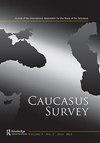纪念。Amri Rzaevich Shikhsaidov(1928年3月20日至2019年9月21日)
IF 0.4
Q3 AREA STUDIES
引用次数: 0
摘要
我们怀着极大的悲痛失去了Amri R.Shikhsaidov教授,他是俄罗斯北高加索阿拉伯语研究的赞助人。Shikhsaidov是达吉斯坦南部Derbent周围Lezgi地区的本地人,1946年前往列宁格勒州立大学学习东方学;在那里,他属于当时苏联最重要的阿拉伯人伊格纳提·克拉奇科夫斯基(1883-1951)的最后一代学生。在列宁格勒大学期间,年轻的Shikhsaidov遇到了他未来的妻子Reia Sergeevna(née Davydova,b.1928),她刚刚经历了德国封锁的恐怖;Reia Sergeevna将是Shikhsaidov余生的伴侣。毕业后,Shikhsaidov曾在达吉斯坦首府Makhachkala短暂担任学校教师,但随后在同一城市的俄罗斯科学院达吉斯坦联邦研究中心的历史、考古和民族志研究所开始了自己的职业生涯。1963年,他为自己关于地区伊斯兰化叙事研究的博士论文(《中世纪达吉斯坦的伊斯兰教》,1969年出版为专著)进行了辩护,1976年,他又为自己的适应能力论文《10至14世纪的达吉斯坦:社会和经济评估的尝试》(一年前以图书形式出版)进行了答辩。1973年至1998年,Shikhsaidov领导了该研究所的东方研究系,该系以其不断增长的手稿收藏而闻名。他还在达吉斯坦州立大学和其他高等教育机构任教。虽然对北高加索伊斯兰教和穆斯林文化的研究在苏联时代是一个敏感问题,但Shikhsaidov通过专注于阿拉伯语的中世纪史学,设法避开了一些官方禁忌。在他之前,克拉奇科夫斯基已经强调了阿拉伯语作为达吉斯坦许多小国的书面通用语的作用。然而,阿拉伯语也将北高加索与更广阔的穆斯林世界联系在一起。Shikhsaidov通过组织每年前往达吉斯坦村庄的探险,研究在斯大林的恐怖和苏联现代化中幸存下来的私人收藏的阿拉伯手稿,进一步发展了这一研究议程。他发现(并以俄语翻译出版)了许多中世纪时期的历史叙事,包括著名的达吉斯坦伊斯兰化编年史(Ta'rikh Daghistan)。从20世纪80年代开始,他还编辑和翻译了19世纪达吉斯坦进入沙俄的漫长高加索战争期间产生的阿拉伯语手稿(特别是伊玛目沙米尔女婿Abdarrahman al-Ghazighumuqi的回忆录,1994年),甚至还有苏联早期的阿拉伯语作品本文章由计算机程序翻译,如有差异,请以英文原文为准。
In memoriam. Amri Rzaevich Shikhsaidov (20 March 1928–21 September 2019)
With great sadness we feel the loss of Professor Amri R. Shikhsaidov, the patron of Arabic studies in Russia’s North Caucasus. A native from the Lezgi areas around Derbent in southern Dagestan, in 1946 Shikhsaidov went to Leningrad State University to pursue Oriental Studies; there he belonged to the last student generation that had classes from the USSR’s foremost Arabist of the time, Ignatii Krachkovskii (1883–1951). While at Leningrad University, the young Shikhsaidov met his future wife, Reia Sergeevna (née Davydova, b. 1928), who had just experienced the horrors of the German blockade; Reia Sergeevna would be Shikhsaidov’s companion for the rest of his life. After graduation Shikhsaidov briefly worked as a school teacher in Makhachkala, Dagestan’s capital, but then made a career at what is today the Institute of History, Archeology and Ethnography in the Dagestani Federal Research Center of the Russian Academy of Sciences, in the same city. In 1963 he defended his doctoral dissertation on the study of regional Islamization narratives (Islam in Medieval Dagestan, printed as a monograph in 1969), followed in 1976 by his habilitation thesis, Dagestan in the 10th to 14th Centuries: An Attempt at a Social and Economic Evaluation (published in book form already one year earlier). From 1973 to 1998 Shikhsaidov directed the Institute’s Department of Oriental Studies, known for its growing manuscript collection. He also taught throughout his career at Dagestan State University and other institutes of higher education. While the study of Islam and Muslim culture in the North Caucasus was a sensitive issue in Soviet times, Shikhsaidov managed to sideline some official taboos by focusing on medieval historiography in the Arabic language. Before him Krachkovskii had already emphasized Arabic’s role as a written lingua franca for the many small nations of Dagestan. Yet Arabic also linked the North Caucasus to the wider Muslim world. Shikhsaidov developed this research agenda considerably further by organizing yearly expeditions to Dagestani villages for the study of Arabic manuscripts in private collections that had survived Stalin’s terror and Soviet modernization. He discovered (and published in Russian translation) numerous historical narratives from the medieval period, including the famous Dagestani chronicle of Islamization (Ta’rikh Daghistan). Starting in the 1980s he also edited and translated Arabic manuscripts produced during the long nineteenth-century Caucasian War when Dagestan entered tsarist Russia (in particular the memoirs of Imam Shamil’s son-in-law, ‘Abdarrahman al-Ghazighumuqi, 1994), and even Arabic works from the early Soviet
求助全文
通过发布文献求助,成功后即可免费获取论文全文。
去求助
来源期刊

Caucasus Survey
Arts and Humanities-History
CiteScore
1.30
自引率
9.10%
发文量
4
期刊介绍:
Caucasus Survey is a new peer-reviewed, multidisciplinary and independent journal, concerned with the study of the Caucasus – the independent republics of Armenia, Azerbaijan and Georgia, de facto entities in the area and the North Caucasian republics and regions of the Russian Federation. Also covered are issues relating to the Republic of Kalmykia, Crimea, the Cossacks, Nogays, and Caucasian diasporas. Caucasus Survey aims to advance an area studies tradition in the humanities and social sciences about and from the Caucasus, connecting this tradition with core disciplinary concerns in the fields of history, political science, sociology, anthropology, cultural and religious studies, economics, political geography and demography, security, war and peace studies, and social psychology. Research enhancing understanding of the region’s conflicts and relations between the Russian Federation and the Caucasus, internationally and domestically with regard to the North Caucasus, features high in our concerns.
 求助内容:
求助内容: 应助结果提醒方式:
应助结果提醒方式:


